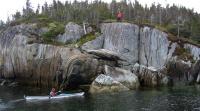 Nova Scotia is approximately 70% privately owned. About 9% is protected primarily for biodiversity, and the government has set a goal of protecting 13% by 2015. Most protected land is provincial or federal Crown land (e.g. national parks, provincial wilderness areas) but some of the province’s threatened species and ecosystems are found only on private lands. As a result, government agencies and conservation organizations encourage conservation on private lands.
Nova Scotia is approximately 70% privately owned. About 9% is protected primarily for biodiversity, and the government has set a goal of protecting 13% by 2015. Most protected land is provincial or federal Crown land (e.g. national parks, provincial wilderness areas) but some of the province’s threatened species and ecosystems are found only on private lands. As a result, government agencies and conservation organizations encourage conservation on private lands.
There are a number of ways to practice conservation on private lands, including:
Donation
Significant natural areas can be protected through donation to a conservation organization or government agency (e.g. Nova Scotia Environment). Donors receive a charitable donation receipt for the value of the land and can qualify for exemption from capital gains tax through the federal EcoGifts Program. Conservation organizations in Nova Scotia include:
The Nova Scotia Nature Trust works to protect vulnerable and significant ecosystems on private land in Nova Scotia, with focus on the coastline and the critical habitat of at-risk species. The Nature Trust also works with volunteers and partners to monitor known populations of Atlantic Coastal Plain Flora. For more information, or to join the Nature Trust volunteer team, visit www.nsnt.ca, contact nature@nsnt.ca or phone 902-425-5263.
The Nature Conservancy of Canada works to protect significant and sensitive ecosystems across Canada. Riparian habitat is a priority in our designated Natural Areas which are the south shore including the entire Tusket River watershed, the eastern shore from Cole Harbour to Taylor Head and the entire Northumberland Strait. If you own intact habitat beside a river, stream or lake in these areas and are interested in conservation contact atlantic@natureconservancy.ca.
Partial Donation/Split-Receipting
Land can be sold to a conservation organization or a government conservation agency for less than market value. The donated portion of the value qualifies for a charitable donation receipt and can be exempted from capital gains tax through the EcoGifts Program.
Acquisition
Sometimes land may be of such high ecological significance that conservation groups or governments are willing to pay fair market value for it. Opportunities for such purchases are limited by available financial resources.
Designation
Land can be designated as protected under the Special Places Protection Act or Wilderness Areas Protection Act. These designations require the owner’s consent and bind both current and future owners. The landowner maintains ownership, but the land is managed as either a Nature Reserve or Wilderness Area and is exempted from property taxes.
Conservation Easement
A conservation easement is a legally binding agreement between a landowner and a conservation organization or government agency which restricts development of land. It binds both current and future owners of the land and often reduces the market value of the land. It qualifies for both a charitable donation receipt and property tax exemption.
Text provided by Nova Scotia Environment, NSNT and NCC.
For more information visit: www.gov.ns.ca/nse/protectedareas

